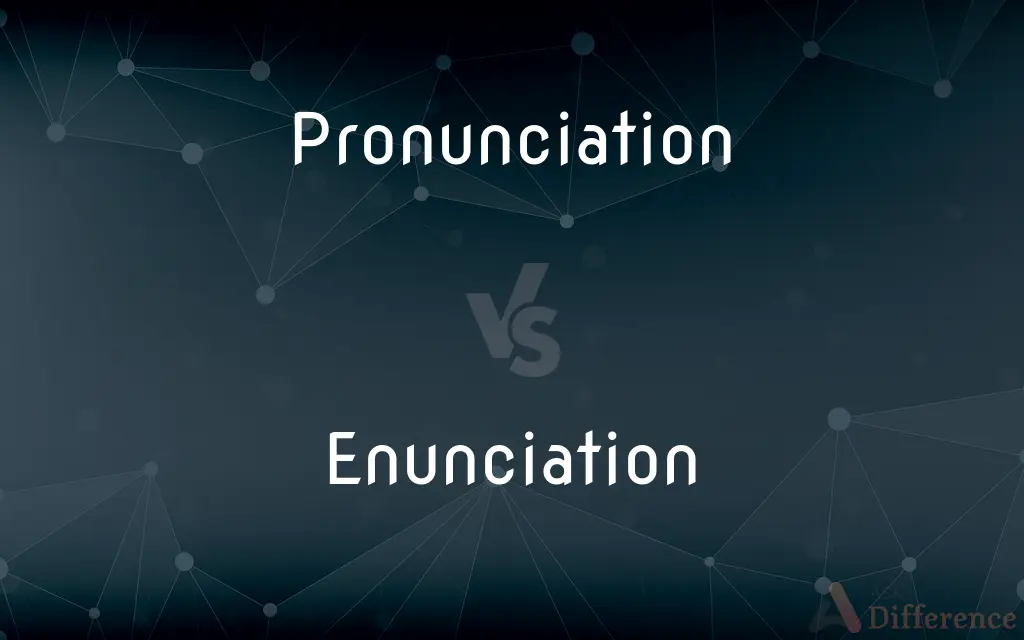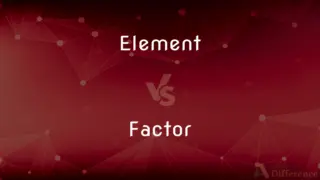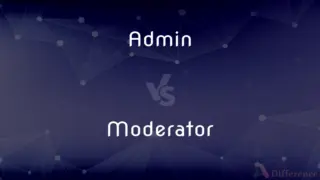Pronunciation vs. Enunciation — What's the Difference?
By Tayyaba Rehman — Updated on October 30, 2023
Pronunciation refers to the correct way to say a word; Enunciation is about clear articulation and distinctness in speech.

Difference Between Pronunciation and Enunciation
Table of Contents
ADVERTISEMENT
Key Differences
Pronunciation specifically relates to how a word is phonetically spoken, highlighting the right emphasis, stress, and intonation. Enunciation, conversely, focuses on the clarity and distinctness with which someone expresses words in general.
When we speak about Pronunciation, we're often discussing the nuances in accents or the correct way to pronounce specific words in a language. Enunciation is broader in its approach, concerning itself with the overall clarity of speech, ensuring words are not slurred or mumbled.
While correct Pronunciation is crucial for being understood in different regions or dialects, good Enunciation is universally essential for clear communication.
In essence, while Pronunciation is about saying the word right, Enunciation ensures the word is spoken clearly and understandably.
Comparison Chart
Primary Focus
How a word is phonetically spoken
Clarity and distinctness of speech
ADVERTISEMENT
Concerns
Emphasis, stress, intonation of words
Articulation, clarity, avoiding mumbling/slurring
Application
Specific to individual words
Applies to general speech
Regional Variance
Pronunciation can vary based on regions or dialects
Enunciation principles remain consistent across dialects
Outcome
Ensures the word aligns with linguistic or regional norms
Ensures words are distinct, clear, and articulated properly
Compare with Definitions
Pronunciation
Pronunciation is the way a word is spoken.
The Pronunciation of tomato varies between American and British English.
Enunciation
Enunciation involves the articulation of words in speech.
Actors train in Enunciation to ensure every line is understood.
Pronunciation
Pronunciation deals with the phonetic sound of words.
The Pronunciation guide helps non-native speakers learn the language.
Enunciation
Enunciation is the act of speaking clearly and distinctly.
His Enunciation was so clear that even those in the back could understand him.
Pronunciation
Pronunciation emphasizes the proper accentuation of words.
Her Pronunciation of foreign names was impeccable.
Enunciation
Enunciation prevents words from being slurred or mumbled.
Proper Enunciation is vital for broadcasters and public speakers.
Pronunciation
Pronunciation is the way in which a word or a language is spoken. This may refer to generally agreed-upon sequences of sounds used in speaking a given word or language in a specific dialect ("correct pronunciation") or simply the way a particular individual speaks a word or language.
Enunciation
To pronounce; articulate.
Pronunciation
The way in which a word is pronounced
Similar pronunciations are heard in Ulster
Spelling does not determine pronunciation
Enunciation
To state or set forth precisely or systematically
Enunciate a doctrine.
Pronunciation
The act or manner of pronouncing words; utterance of speech.
Enunciation
To announce; proclaim.
Pronunciation
A way of speaking a word, especially a way that is accepted or generally understood.
Enunciation
To pronounce words; speak aloud.
Pronunciation
A graphic representation of the way a word is spoken, using phonetic symbols.
Enunciation
The act of enunciating, announcing, proclaiming, or making known; open attestation; declaration.
It was time for the enunciation of an important truth.
Pronunciation
(countable) The formal or informal way in which a word is made to sound when spoken.
What is the pronunciation of "hiccough"?
Enunciation
Mode of utterance or pronunciation, especially as regards fullness and distinctness or articulation.
She speaks with an impressively clear enunciation.
Pronunciation
(uncountable) The way in which the words of a language are made to sound when speaking.
His Italian pronunciation is terrible.
Enunciation
That which is enunciated or announced; words in which a proposition is expressed; formal declaration
Pronunciation
(countable) The act of pronouncing or uttering a vocable.
Enunciation
The act of enunciating, announcing, proclaiming, or making known; open attestation; declaration; as, the enunciation of an important truth.
By way of interpretation and enunciation.
Pronunciation
The act of uttering with articulation; the act of giving the proper sound and accent; utterance; as, the pronunciation of syllables of words; distinct or indistinct pronunciation.
Enunciation
Mode of utterance or pronunciation, especially as regards fullness and distinctness or articulation; as, to speak with a clear or impressive enunciation.
Pronunciation
The mode of uttering words or sentences.
Enunciation
That which is enunciated or announced; words in which a proposition is expressed; an announcement; a formal declaration; a statement.
Every intelligible enunciation must be either true or false.
Pronunciation
The art of manner of uttering a discourse publicly with propriety and gracefulness; - now called delivery.
Enunciation
The articulation of speech regarded from the point of view of its intelligibility to the audience
Pronunciation
The manner in which someone utters a word;
They are always correcting my pronunciation
Enunciation
Enunciation focuses on the clarity of spoken language.
Enunciation exercises can improve speech clarity and confidence.
Pronunciation
The way a word or a language is customarily spoken;
The pronunciation of Chinese is difficult for foreigners
That is the correct pronunciation
Enunciation
Enunciation concerns making each syllable distinct.
Her Enunciation of complex terms made the lecture easier to follow.
Pronunciation
Pronunciation concerns the accepted standard of sounding a word.
Incorrect Pronunciation can lead to misunderstandings in conversation.
Pronunciation
Pronunciation can vary based on region or culture.
The Pronunciation of certain words in the South differs from the North.
Common Curiosities
Can you have good Pronunciation but poor Enunciation?
Yes, one might pronounce words correctly but still mumble or slur while speaking.
What does Pronunciation focus on?
Pronunciation focuses on how a specific word is phonetically spoken.
How does Enunciation differ from Pronunciation?
Enunciation is about speaking words clearly and distinctly, while Pronunciation is about saying a word correctly.
Is Pronunciation more important than Enunciation?
Both are essential. Pronunciation ensures words are said correctly, while Enunciation ensures clarity in speech.
Why is Enunciation crucial for public speaking?
Enunciation ensures that listeners can understand each word, making the message clear.
Can training improve Enunciation?
Yes, speech and vocal exercises can enhance Enunciation.
Can poor Enunciation lead to misunderstandings?
Yes, if words are mumbled or slurred, the intended message might not be conveyed.
Does singing require good Enunciation?
Yes, clear Enunciation in singing ensures lyrics are understood and appreciated.
Does Pronunciation vary between dialects?
Yes, Pronunciation can vary based on regions or cultural dialects.
Why might Enunciation be a focus in acting classes?
Clear Enunciation ensures that lines are understood, enhancing storytelling.
How does one know if their Pronunciation is correct?
Listening to native speakers, consulting dictionaries, or using language apps can guide correct Pronunciation.
Is Enunciation only about clarity?
Primarily, but it also involves proper articulation and distinction of words.
What can affect one's Pronunciation?
Native language, regional accents, and exposure can influence Pronunciation.
Are there tools to improve Pronunciation?
Yes, language learning apps, dictionaries with audio, and pronunciation guides can help.
Can Pronunciation change over time?
Yes, Pronunciation can evolve with cultural shifts or linguistic changes.
Share Your Discovery

Previous Comparison
Element vs. Factor
Next Comparison
Admin vs. ModeratorAuthor Spotlight
Written by
Tayyaba RehmanTayyaba Rehman is a distinguished writer, currently serving as a primary contributor to askdifference.com. As a researcher in semantics and etymology, Tayyaba's passion for the complexity of languages and their distinctions has found a perfect home on the platform. Tayyaba delves into the intricacies of language, distinguishing between commonly confused words and phrases, thereby providing clarity for readers worldwide.














































